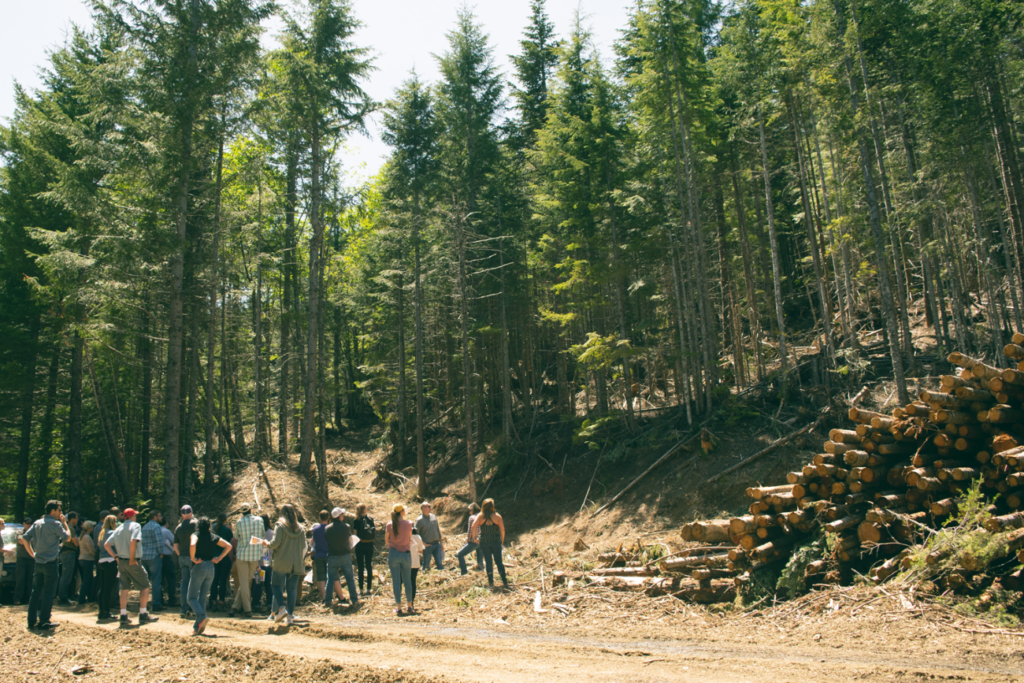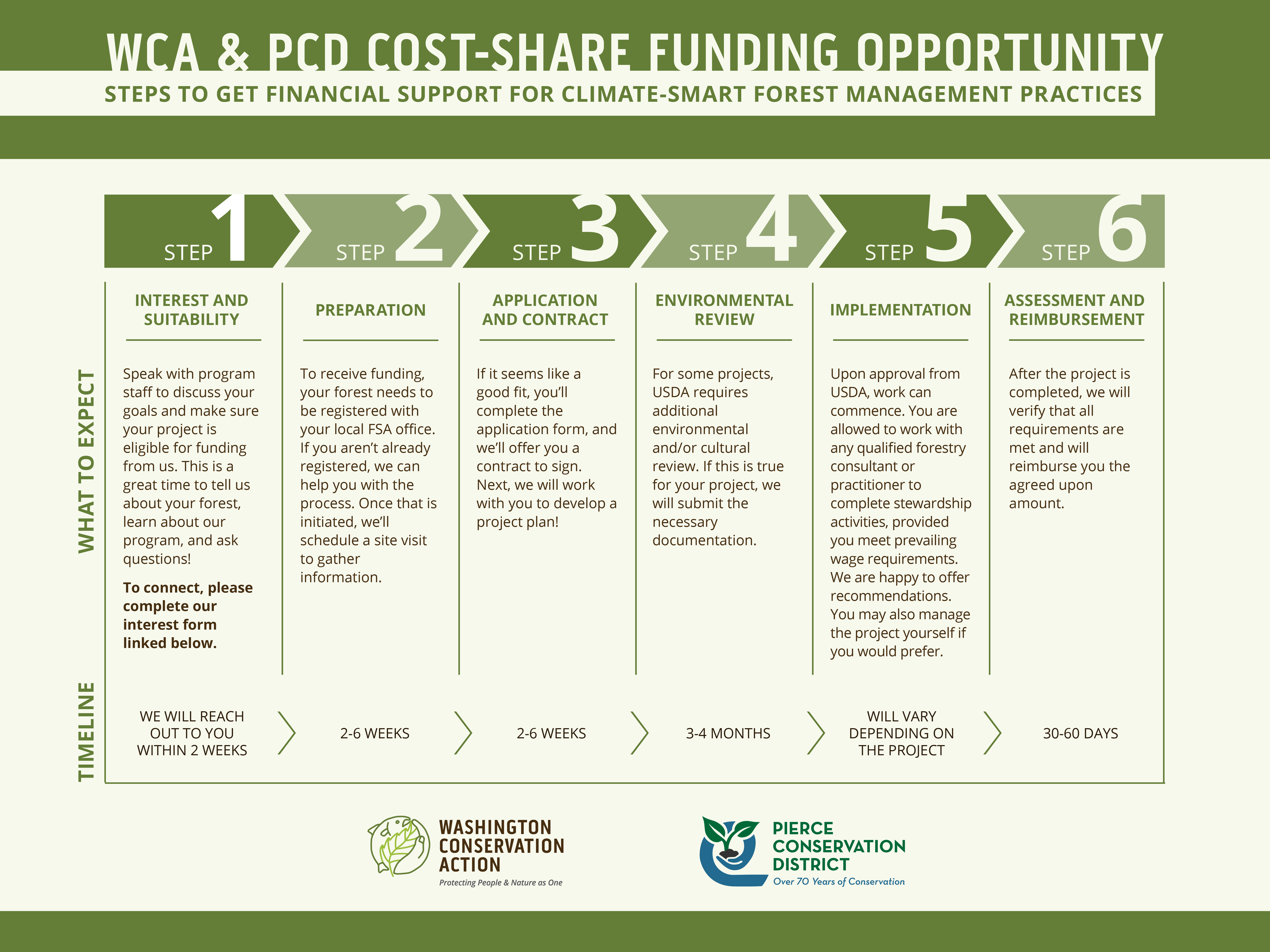Investing in
Climate-Smart Forestry
Important funding opportunity for landowners in Pierce County, Washington
Washington Conservation Action and Pierce Conservation District now offer cost-share assistance directly to private forestland owners in Pierce County, Washington. Cost-share funding supports stewardship activities that increase carbon sequestration and storage, improve wildlife habitat, mitigate wildfire risk, and improve your forest’s resilience to climate change.


Interested in learning more? Fill out our interest form below and we will get in touch with you within 2 weeks!
Reimbursement rate table here.
Climate-smart forestry increases forest resilience in the face of climate change and sequesters and stores more carbon over time compared to conventional practices. Climate-smart forestry also addresses issues of equity and climate justice, improving community well-being and respecting the rights of Indigenous Peoples. Learn more at https://www.climatesmartwood.net/
This project is supported by a $25 million USDA Climate Smart Commodities grant and includes seven other partner organizations with a shared vision: to expand climate-smart forestry among non-industrial landowners across the Pacific Northwest and to increase access to and recognition for the benefits of climate-smart wood products.

Our core partners on this project are Sustainable Northwest, Pierce Conservation District, Northwest Natural Resource Group, Ecotrust, Vibrant Planet Data Commons, Vibrant Planet Public Benefit Corporation, and Trout Mountain Forestry.
How long does this funding opportunity last?
Do I need to register with the Farm Services Agency?
What if I change my mind and want to undo a practice I’ve already received funding for completing (for example, harvest part of a riparian buffer I received payments to expand)?
Can nonprofit organizations that own land participate in the program?
Are city, county, and state forests eligible to participate?
Are forests managed by Tribal governments eligible to participate?
How is this different from existing programs, such as EQIP?
Can I get funding to do the same thing that EQIP or another federal program is funding me to do on my land?
Can I get funding for a project I have already completed or am about to start?
If I lease land, can I still participate?
Will this funding cover the full cost of stewardship activities?
Are practices eligible for multiple payments?
How can I find out if my forest is in need of any of these stewardship activities?
If I receive funding through this program, who should I use as my forestry consultant to complete the stewardship activities?
This material is based upon work supported by the U.S. Department of Agriculture, under agreement number NR233A750004G042. Any opinions, findings, conclusions, or recommendations expressed in this publication are those of the author(s) and do not necessarily reflect the views of the U.S. Department of Agriculture. In addition, any reference to specific brands or types of products or services does not constitute or imply an endorsement by the U.S. Department of Agriculture for those products or services. In accordance with Federal civil rights law and U.S. Department of Agriculture (USDA) civil rights regulations and policies, the USDA, its Agencies, offices, and employees, and institutions participating in or administering USDA programs are prohibited from discriminating based on race, color, national origin, religion, sex, gender identity (including gender expression), sexual orientation, disability, age, marital status, family/parental status, income derived from a public assistance program, political beliefs, or reprisal or retaliation for prior civil rights activity, in any program or activity conducted or funded by USDA (not all bases apply to all programs). Remedies and complaint filing deadlines vary by program or incident. Persons with disabilities who require alternative means of communication for program information (e.g., Braille, large print, audiotape, American Sign Language, etc.) should contact the responsible Agency or USDA’s TARGET Center at (202) 720-2600 (voice and TTY) or contact USDA through the Federal Relay Service at (800) 877-8339. Additionally, program information may be made available in languages other than English. To file a program discrimination complaint, complete the USDA Program Discrimination Complaint Form, AD-3027, found online at How to File a Program Discrimination Complaint and at any USDA office or write a letter addressed to USDA and provide in the letter all of the information requested in the form. To request a copy of the complaint form, call (866) 632-9992. Submit your completed form or letter to USDA by: (1) mail: U.S. Department of Agriculture, Office of the Assistant Secretary for Civil Rights, 1400 Independence Avenue, SW, Washington, D.C. 20250-9410; (2) fax: (202) 690-7442; or (3) email: program.intake@usda.gov. USDA is an equal opportunity provider, employer, and lender.
Ava Stone, Climate Smart Wood Senior Manager